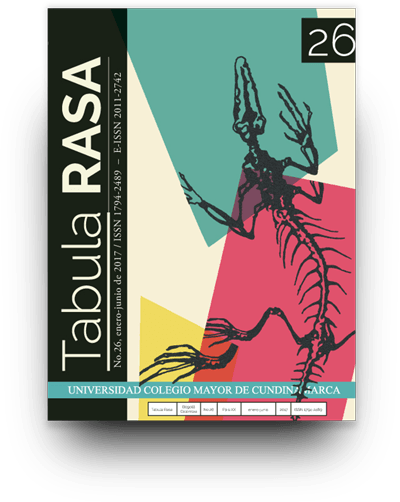Mostrar biografía de los autores
«Somos petróleo» es un experimento de práctica-como-investigación creado para indagar sobre la manera como los norteamericanos conceptualizan sus relaciones con el petróleo. Durante el performance los participantes leyeron en voz alta emulaciones del testimonio diplomático Gwich'in sobre ser pueblo caribú. En las emulaciones, el texto es el mismo salvo que se reemplaza la palabra «caribú» por «petróleo». Los Gwich'in son un pueblo indígena cuyas tierras de origen se sitúan en el noreste de Alaska y el noroeste de Canadá. Durante décadas, han impedido la explotación de gas y petróleo en los terrenos donde nacen los becerros de la manada de Caribús Puercoespín (Porcupine Caribou). El rebaño los sostiene a ellos y su identidad. Este artículo se ocupa del testimonio original Gwich'in y del performance que emula su testimonio para enactúar. las relaciones petróleo-humanos en términos de las relaciones caribú-Gwich'in. El artículo y el performance usan teorías indígenas de la ley y la figuración ecológica para provocar la reflexión sobre las relaciones del petróleo como parentesco sustantivo, estructuración del orden legal y cosmología.
Visitas del artículo 123 | Visitas PDF 46
Descargas
- Anderson, K. (2005). Tending the wild: Native American knowledge and the management of California’s natural resources. Berkeley and Los Angeles: University of California Press.
- Awiakta, M. (1993). Selu: Seeking the corn-mother’s wisdom. Golden: Fulcrum Pub.
- Banerjee, S. (2012). Arctic voices: resistance at the tipping point. New York: Seven Stories Press.
- Bass, R. (2004). Caribou Rising: Defending the Porcupine Herd, Gwich-’in Culture, and the Arctic National Wildlife Refuge (1 edition). San Francisco: Sierra Club Books.
- Benjamin, W. (1968). Illuminations (Vol. 241). New York: Schocken Books Incorporated.
- Black, C. F. (2010). The land is the source of the law: a dialogic encounter with indigenous jurisprudence (Taylor & Francis e-Library Kindle Edition). London: Routledge.
- Bridge, G., & Le Billon, P. (2013). Oil. Cambridge: John Wiley & Sons.
- Coulthard, G. S. (2014). Red Skin, White Masks: Rejecting the Colonial Politics of Recognition. Minneapolis: University Of Minnesota Press.
- Cowen, D. (2014). The Deadly Life of Logistics: Mapping Violence in Global Trade. Minneapolis: University of Minnesota Press.
- De la Cadena, M. (2015). Earth beings: Ecologies of practice across Andean worlds. Durham and London: Duke University Press.
- Deloria, V. (2006). The world we used to live in: remembering the powers of the medicine men. Golden, CO: Fulcrum Pub.
- Drum, D. (2016). We are Petroleum [Performance interactivo].
- Gertz, E. (2017). Gwich’in Gear Up to Fight for Alaska’s Arctic National Wildlife Refuge. Arctic Deeply. Retrieved from https://www.newsdeeply.com/arctic/articles/2017/06/14/gwichin-gear-up-to-fight-for-alaskas-arctic-national-wildlife-refuge
- Gwich’in Steering Committee. (2004). Protect the Sacred Place Where Life Begins. Gwich’in Steering Committee. Retrieved from http://ourarcticrefuge.org/resources/
- Gwich’in Steering Committee. (2005). A Moral Choice for the United States. Gwich’in Steering Committee. Recuperado de http://ourarcticrefuge.org/wp-content/uploads/2012/10/GSChumanrightsreport.pdf
- Hames, R. (2007). The Ecologically Noble Savage Debate. Annual Review of Anthropology, 36(1), 177–190. https://doi.org/10.1146/annurev.anthro.35.081705.123321
- Huber, M. T. (2009). The use of gasoline: Value, oil, and the “American way of life.” Antipode, 41(3), 465-486.
- Kimmerer, R. W. (2014). Braiding Sweetgrass: Indigenous Wisdom, Scientific Knowledge and the Teachings of Plants. Minneapolis, Minn: Milkweed Editions.
- Kulchyski, P. (2012). Aboriginal Rights Are Not Human Rights. Winnipeg, Manitoba: Arbeiter Ring Publishing.
- Lee, P. (1991, September 15). Some Native Peoples See Dividends, Others See Disaster in Oil Drilling. Los Angeles Times. Recuperado de http://articles.latimes.com/1991-09-15/news/mn-3692_1_native-peoples
- Miller, D. S. (2001). Arctic Refuge: A Circle of Testimony. (H. Lentfer & C. Servid, Eds.). Minneapolis, Minn: Milkweed Editions.
- Mitchell, T. (2013). Carbon Democracy: Political Power in the Age of Oil. London: Verso Books.
- ˈhazard, v. (n.d.). OED Online. Oxford University Press. Recuperado de http://www.oed.com/view/Entry/84854
- O’Malley, J. (2015, 14 de marzo). Listen to the Gwich’in | Al Jazeera America [Periodismo]. Recuperado el 3 de noviembre, 2015, de http://projects.aljazeera.com/2015/03/arctic-village/
- Povinelli, E. A. (2002). The cunning of recognition: indigenous alterities and the making of Australian multiculturalism. Durham: Duke University Press.
- Raibmon, P. (2005). Authentic Indians: Episodes of Encounter from the Late-Nineteenth-Century Northwest Coast. Durham: Duke University Press.
- Riley, S. R., & Hunter, L. (Eds.). (2009). Mapping Landscapes for Performance as Research. Basingstoke: Palgrave Macmillan. Recuperado de http://www.palgraveconnect.com/pc/doifinder/10.1057/9780230244481
- Rosaldo, R. (1989). Imperialist nostalgia. Representations, 107-122.
- Sarah J. (2000, December). An interview with Sarah James regarding the Arctic Wildlife Refuge. Recuperado de http://www.duncanentertainment.com/james.php
- Sarah J: Indigenous Peoples and Climate Change. (2009). [Video en línea]. Bioneers. Recuperado de https://vimeo.com/16666326
- Sherry, E., & Vuntut Gwitchin First Nation. (1999). The Land Still Speaks– Gwitchin Word About Life in Dempster County. Vuntut Gwitchin First Nation. Recuperado de http://www.vgfn.ca/book-order.php
- Simpson, A. (2014). Mohawk Interruptus. Durham: Duke University Press. Recuperado de http://read.dukeupress.edu/content/mohawk-interruptus
- Simpson, L. (2008). Looking after Gdoo-naaganinaa: Precolonial Nishnaabeg Diplomatic and Treaty Relationships. Wicazo Sa Review, 23(2), 29-42. https://doi.org/10.1353/wic.0.0001
- Smithers, G. D. (2015). Beyond the “Ecological Indian”: Environmental Politics and Traditional Ecological Knowledge in Modern North America. Environmental History, 20(1), 83-111. https://doi.org/10.1093/envhis/emu125
- TallBear, K. (2000). Shepard Krech’s The Ecological Indian: One Indian’s Perspective. International Institute for Indigenous Resource Management [IIIRM] Publications., 30. Recuperado de http://www.iiirm.org/review/bkreview.htm
- Watts, M.J. (2006). Empire of Oil. Monthly Review, 58/4, 1–16.




